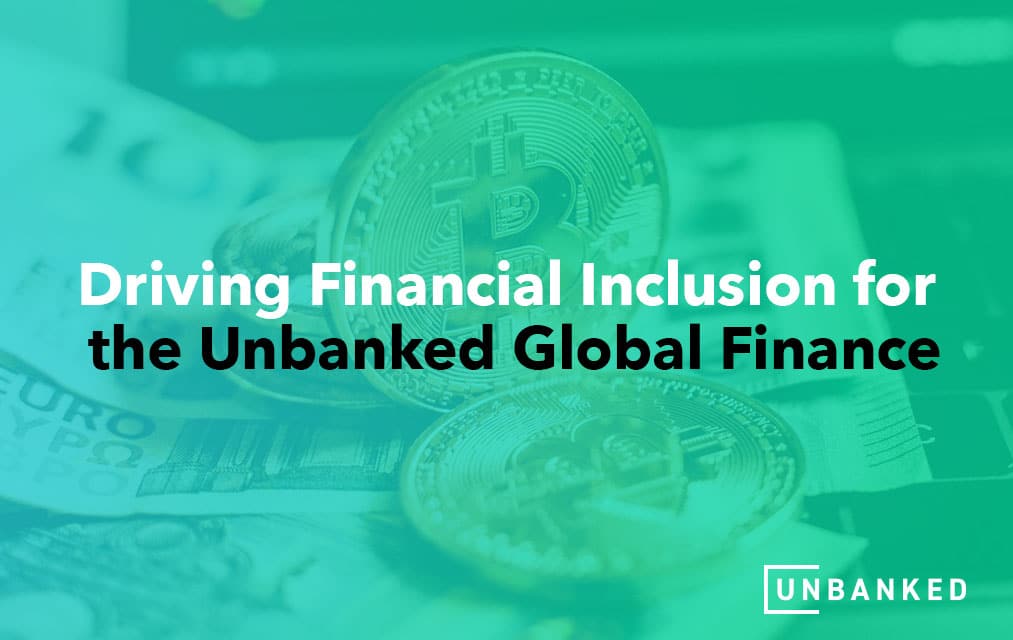Technology is driving financial inclusion worldwide. With the onset of individuals being able to bank online and with continued advances in fintech like cryptocurrencies and blockchain, this has allowed many countries to cater to the unbanked populations. This has been particularly helpful to those who rely heavily on cash as their only source of inclusion in the financial world.
Over the past few years, inclusion in the financial world has gain momentum. From 2014 through 2017, many unbanked individuals have seen an increase in getting the banking needs met. What used to be an unbanked world population of 2.5 billion has now dropped significantly to 1.7 billion.
At least fifty-five countries have made a significant commitment to including their unbanked population on a financial level. While this is a significant move forward, the global economy’s cost is still in the upper billions per year. This means that for those who rely primarily on cash, this can prove a significant challenge when it comes to the unbanked population saving for the future. This also affects an individual’s ability to save for education and even investing in a business. There are also the unsafe practices of relying solely on cash as it can be expensive and even inconvenient.
The Digital Advantage
Most of the unbanked individuals live in a developing country. At the same time, developed countries have more access to banks while developing countries have limited access to branches. While the need for a physical branch has diminished slightly due to the internet and mobile technology, some are still useful. Approximately two-thirds of the world’s unbanked individuals own a mobile phone. This has shown an increase in internet usage and the ability to allow them to send or receive payments through financial services they usually wouldn’t have access to.
With more and more unbanked individuals gaining access to mobile phones or other mobile technology, they’re able to open digital bank accounts, invest in cryptocurrencies and other blockchain technologies. They no longer have to go a physical branch as everything is now done on a digital level.
This offers the unbanked a great deal of flexibility. This is especially helpful as it can help a person and their families deal with economic setbacks. It also allows the unbanked to invest in their business or even create jobs and invest in stocks, crypto, and other financial services. This has not only helped the unbanked but has also proven an immense boon for women who live in countries where having any financial freedom is limited even more due to politics.
Financing Growth in the World of the Unbanked
Financial inclusion is moving forward rapidly in many countries, with India leading the way. The country has seen a leap in the open rate of financial accounts. However, some countries are resistant and have many individuals who would rather deal with someone they know over a financial institution. To combat this, many countries are actively promoting fintech services and other mobile bank schemes. With the growth of blockchain and cryptocurrencies making headlines, many see alternatives to their finances becoming more expansive by the day.
Financial growth in some areas is due to many lenders offering loans that are easier to obtain for the unbanked populations. By using a scoring similar to the U.S., enables lenders to extend lower-cost access to finances. This, in turn, helps stimulate the expansion of the economy.
Inclusions are Closing the Gender Divide
With financial inclusion helping the unbanked, one of the main targets for this inclusion is women. In many unbanked areas, men will be more than likely to have a bank account over a woman. In many places, the gender divide has grown due to socio-political means. However, due to recent blockchain technology and online banking, the financial gap is slowly diminishing. This is particularly true in areas where gender equality has become more mainstream.
While gender disparities still exist, especially in health and education, many countries are opening up more on the financial side, opening up doors with the others. Many areas are looking into women-empowerment as a way to drive financial inclusion as they see women-owned capital as a massive boon to their countries ongoing development. With a global partnership that focuses on financially including all genders, women’s economic empowerment is an area that is starting to become addressed more to keep inclusion and development as part of an economy’s success.
Financial Inclusions and the Return on Investment
Many developing countries are hosts to many innovative fintech businesses. Most of these include and even promote their digital financial services. While these fintech companies are out there, it will take more encouragement for them to expand, which needs more investment from their local governments. Investing in these financial services is vital as it helps achieve profitability. While this profitability takes a few years, it sets a foundation for a market that can solve problems related to the economy.
Due to this, many investors have seen the opportunity that the unbanked population has to offer. With investment in developing digital financial services and mobile payments has elevated the investment benchmark. Further investment in fintech businesses and even blockchain will help the unbanked and grow the economy and help the country see a better and more substantial investment return.
However, this requires a collaborative mindset and a push towards financial inclusion. Both are tied to a country’s economic growth and prosperity. With ongoing investment in newer business models and financial technologies, many developing areas will see the financial inclusion they need to prosper. As technology continues to move forward at a fast pace and continually innovates, the financial sector will eventually allow the unbanked to be fully included in the financial services that are offered. While this change won’t happen overnight, the continued expansion of fintech and the growing popularity of blockchain will help many areas in their work toward inclusion.





